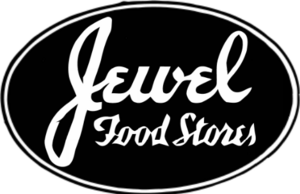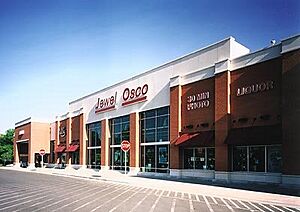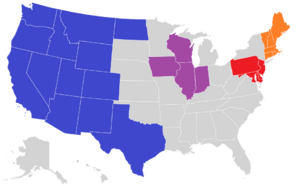Jewel-Osco facts for kids
 |
|
|
Formerly
|
|
|---|---|
| Subsidiary | |
| Industry | Retail |
| Founded | 1899 in Chicago, Illinois, U.S. |
| Founder | Frank Vernon Skiff |
| Headquarters | Itasca, Illinois, U.S. |
|
Number of locations
|
188 (2007) |
|
Area served
|
Illinois, Iowa, and Indiana |
|
Key people
|
Mike Withers, President |
| Products | Bakery, dairy, deli, frozen foods, grocery, meat, pharmacy, produce, seafood, snacks and flowers |
| Services | supermarkets/food-drug stores |
| Parent | Independent (1899–1967) Public company (1967–1984) American Stores (1984–1999) Albertsons (1999–present) |
Jewel-Osco is a popular supermarket chain. It has many stores in the Chicago metropolitan area. Its main office is in Itasca. In 2007, Jewel-Osco had 188 stores. These stores were in Illinois, Iowa, and Indiana.
Jewel-Osco is owned by Albertsons. It has been part of Albertsons since 1999. The company started in a very different way. It began by delivering coffee to people's homes. Later, it grew into large grocery stores and supermarkets.
Contents
- A Look at Jewel-Osco's History
- Starting with Home Deliveries
- Opening Grocery Stores
- Eisner Stores and Southern Growth
- Expanding Beyond Food Stores
- Growth in the 1960s and 1970s
- American Stores Takes Over
- Albertsons and SuperValu Take Over
- Jewel Express Gas Stations
- Urban Fresh Stores
- Green Buildings: LEED Certified
- Jewel-Osco Today
- Trying to Buy Strack & Van Til
- Past Store Ideas
- President's Choice Brand
- How Jewel-Osco Works
- Jewel-Osco Stores
- See also
A Look at Jewel-Osco's History
Starting with Home Deliveries
In 1899, Frank Vernon Skiff started Jewel in Chicago. He delivered coffee right to people's doors. In 1902, he teamed up with Frank P. Ross. They renamed the business the Jewel Tea Company.
By 1903, they had six delivery routes. By 1915, they had grown to 850 routes. They even had a "coffee train" with 40 cars. This train carried coffee beans from South America.
During World War I, the company faced high costs. The US government also took over a key Jewel factory. This caused big money problems by 1919. But new leaders helped the company become profitable again. These leaders were John M. Hancock and Maurice H. Karker. They had experience from being US Navy supply officers.
In 1929, Jewel built a new office and warehouse. It was in Barrington, Illinois. This created many jobs during the Great Depression. This location was the main office and warehouse until 1953. Then, a new complex opened in Melrose Park.
By 1949, Jewel delivered to 1,876 routes in 43 states. Most customers lived in small towns. People in cities could visit 154 company-owned grocery stores.
The home delivery service grew to offer many items. By 1981, it had 350 grocery items. It also had 10,000 general merchandise items. Jewel then sold this part of its business to its employees. The delivery division became a cooperative. It was called "J.T.'s General Store."
In 1994, managers bought "J.T.'s General Store." They created "J.T. Dealers Sales and Service." By 1995, this service reached 60,000 customers. It had 250 routes in 35 states.
Opening Grocery Stores
Jewel continued to grow in the mid-1900s. In 1932, Jewel bought 77 self-service stores in Chicago. These were from a Canadian company called Loblaw Groceterias, Inc.. Jewel also bought four stores from Middle West Stores Company. They started running them as Jewel Food Stores.
In 1934, Jewel Food Stores joined with Jewel Tea Company. The main company was still called "Jewel Tea Company." In 1967, its owners voted to change the name. They called it Jewel Companies, Inc. This new name showed that the company was growing into different areas.
Eisner Stores and Southern Growth
In 1957, Jewel bought Eisner Food Stores. These stores were in Champaign, Illinois. They were also in west central Indiana. This was a big step for Jewel. It was the first time Jewel kept a new company as a separate part of its business. The Eisner stores kept their original names.
In 1984, another company, American Stores, took over Jewel. American Stores decided to combine Eisner with Jewel. All Eisner stores became Jewel stores. Many former Eisner locations were later sold. For example, stores in Lafayette and Bloomington, Indiana, were sold in 1990. Jewel also closed former Eisner stores in central Illinois.
Expanding Beyond Food Stores
In 1961, Jewel bought two other types of stores. They bought Chicago-based Osco Drug stores. They also bought Turn Style discount department stores. These additions helped Jewel create "one-stop shopping" places. These were called Family Centers or Jewel-Osco stores.
Buying Osco and Turn Style helped Jewel grow. It allowed them to sell things other than food. It also helped them expand into new areas. In 1972, Jewel also bought Republic Lumber. This meant they entered the home improvement business.
Growth in the 1960s and 1970s
Jewel kept growing in the 1960s. They bought more food store chains. These included Star Market in 1964 and Buttrey Food Stores in 1966. Star Market also owned Brigham's Ice Cream. Jewel later sold Brigham's in 1982.
In 1965, Jewel started a chain of convenience stores. They were first called Kwik Shoppe. Soon after, they were renamed White Hen Pantry.
Before 1970, Jewel stores were often on city streets. From 1970 to 1990, Jewel moved or expanded most stores. They became standalone buildings with lots of parking. Jewel also built many Jewel-Osco stores side-by-side. After 1983, most new stores combined Jewel and Osco under one roof. Today, they feel like one big store. You can check out items from both at any register.
The first Jewel-Osco combined stores opened in 1962. Jewel opened five stores in Michigan in the 1970s. But they closed all of them in 1996. In 1971, Jewel expanded into Wisconsin. They bought eight Kroger stores and renamed them Jewel. Jewel closed all its Wisconsin stores in 1980. They sold them to Sentry Foods. Jewel did not return to Wisconsin until 1995.
Until 2010, Jewel and Osco parts of the same store had separate managers and operations. In 2010, they put both under one store director. This helped save money.
American Stores Takes Over
In 1984, American Stores wanted to buy Jewel Companies. Jewel's chairman, Weston Christopherson, did not want this to happen. But American Stores went ahead with a "hostile takeover." This means they bought enough shares to take control. On June 1, 1984, American Stores offered $1.1 billion for Jewel.
After some talks, Jewel agreed to the offer. American Stores then sold off some of Jewel's other businesses. They sold Buttrey Food Stores, Star Market, and White Hen Pantry. This helped them pay off debt.
Growth in the 1990s
In 1989, American Stores expanded Jewel-Osco to Florida. These stores were separate from the ones in the Midwest. Florida was a good market because many people from Chicago moved there. After three years, American Stores closed these Florida Jewel-Osco stores. They sold them to Albertsons in 1992.
American Stores also changed some of its other stores to Jewel-Osco. In 1991, they changed 76 stores in Texas, Oklahoma, New Mexico, and Arkansas. These stores were previously called Skaggs-Alpha Beta. Within six months, American Stores sold most of these stores to Albertsons. They kept the New Mexico stores for a few more years.
In 1998, the New Mexico Jewel-Osco stores changed names again. They became Lucky/Sav-on. After Albertsons bought American Stores, these New Mexico stores changed again. They became Albertsons Sav-on in 1999.
Under American Stores, Jewel returned to Wisconsin in 1995. They opened a Jewel-Osco store in Kenosha, Wisconsin. In 1998, Jewel returned to Milwaukee. They bought and changed some other grocery stores into Jewel-Osco stores.
Albertsons and SuperValu Take Over
Albertsons bought American Stores in 1999. This included all Jewel and Jewel-Osco stores.
In 2006, Albertsons was split up. Most Jewel-Osco stores became part of SuperValu. Two stores in Springfield, Illinois, were sold to another group. These are now called County Market stores. All separate Osco drugstores were sold to CVS Pharmacy. The Osco name is still used for pharmacies inside Albertsons and Jewel stores.
In 2007, SuperValu announced it would sell its Milwaukee-area Jewel-Osco stores. Some were bought by Pick 'n Save. Others were bought by Lena's Food Market. The remaining stores closed if they were not sold.
In 2008, the Jewel-Osco main office moved from Melrose Park to Itasca.
Jewel Express Gas Stations
In 1997, Albertsons added gas pumps and a small store to one of its stores. This was in Eagle, Idaho. It was a success. So, Albertsons expanded this idea. They called it Albertsons Express.
After Albertsons bought Jewel-Osco, they brought the Express idea to Jewel. The first Jewel Express opened in South Elgin in 2000. It was in front of a Jewel-Osco store.
In 2009, SuperValu tried to improve the Express concept. They made the convenience stores bigger. They also added car washes. But this did not help SuperValu make more money. In 2011, SuperValu decided to leave the fuel business. They sold or closed all their gas stations. This included 29 Jewel Express stations. Most of these were sold to Alimentation Couche-Tard, which owns Circle K.
Not all Jewel Express locations closed or became Circle K. Two in East Moline, Illinois and Moline, Illinois still operate as Jewel Express.
Urban Fresh Stores
In 2008, SuperValu opened a new type of store. It was called Urban Fresh by Jewel. This store was smaller than a regular Jewel. It focused on fancier and organic products. This store closed in October 2009. No other stores like it were opened.
Green Buildings: LEED Certified
In October 2008, Jewel-Osco opened its first LEED certified store in Chicago. LEED means "Leadership in Energy and Environmental Design." This new store was built using recycled materials. It recycled 98% of its construction waste. It had a garden on the roof. It used water-saving devices. It also used energy-efficient lighting.
Jewel-Osco Today
Jewel-Osco has more than 45,000 employees. It is a very popular grocery store in Chicago. About 80% of homes in the Chicago area visit a Jewel-Osco store at least once a month.
In 2013, SuperValu sold Jewel food stores to Cerberus Capital Management. The deal was worth $3.3 billion.
Trying to Buy Strack & Van Til
In 2017, Jewel-Osco tried to buy 19 Strack & Van Til grocery stores. They offered $100 million. But Jewel-Osco did not win the bid. The stores were sold to the Strack and Van Til families.
Past Store Ideas
Over the years, Jewel has tried different store concepts. They were one of the first to sell "generic brand" products in 1977. These products had simple packaging. They just listed the contents on a white package. Later, this generic line was called "Econo Buy."
Jewel Grand Bazaar
In 1973, Jewel Companies opened an experimental store. It was called Jewel Grand Bazaar. This store was huge. It covered an entire city block in Chicago. It offered bulk packaging and free samples on weekends. It was also open 24 hours. This experimental store operated until the 1980s. Then, it became a regular Jewel-Osco store.
More Grand Bazaar stores opened in Chicago and Franklin Park. The one on Diversey Avenue later became a regular Jewel store. But it kept some "Grand Bazaar" features like bulk foods. This store was torn down in 2003 and replaced with a smaller Jewel.
Turn Style Discount Stores
In 1961, Jewel Companies bought a chain of discount stores. They were in the Chicago area and called Turn Style. These stores were quite successful in the 1960s. Some Turn Style locations were combined with Jewel supermarkets. They formed "Family Centers." In 1978, most Turn Style stores were sold. Others became large Osco Drug Stores.
Jewel T Discount Groceries
In the late 1970s, Jewel Companies ran a simple grocery chain. It was called Jewel T. The name sounded like "Jewel Tea," which was the company's old name. These stores were usually small, about 8,000 square feet. They sold mostly canned and dry foods. Everything was sold at a big discount.
To avoid competing with their own stores, the first Jewel T opened in New Port Richey, Florida, in 1977. More stores quickly opened in Florida. Jewel T expanded to Pennsylvania in 1978 and Atlanta in 1979. By the end of 1979, Jewel T had 87 stores in many states.
At its peak in 1981, Jewel T had 150 stores in 10 states. But it faced problems competing with full-service supermarkets. These larger stores started lowering their prices. Within a few years, Jewel T began selling its less profitable stores. In 1984, the company closed all 21 Jewel T stores in Southern California. Most of the remaining stores were sold to other companies.
Republic Lumber Home Improvement
Jewel Companies also entered the home improvement business. They bought Republic Lumber in 1972. In 1979, Jewel sold most of its Republic Lumber locations. The last one closed early in 1979.
President's Choice Brand
When Jewel-Osco was part of American Stores, it sold President's Choice products. This is a popular brand from Canada. It is made by Loblaw Companies Limited. Loblaw allows other stores to sell their President's Choice brand. This happens in areas where Loblaw does not compete.
When Albertsons bought American Stores, the deal with Loblaw ended. In 2011, SuperValu replaced President's Choice. They used their own brands, Culinary Circle and Wild Harvest.
How Jewel-Osco Works
A 1972 book by Jewel leaders talked about their ideas. They believed in being good citizens in the community. They also believed in helping young people.
A former Jewel-Osco chairman, Don Perkins, said Jewel has a "people orientation." One idea was the "first assistant" philosophy. This meant that managers should see themselves as helping their employees. They would listen to problems and suggest solutions. Then, the employees' job was to help the customers.
Jewel was also good at working with other companies. This was called creating partnerships with vendors. It was not common at the time.
Jewel-Osco Stores
Current Stores
- Albertsons LLC owns these Jewel-Osco stores:
- Jewel-Osco and Jewel stores (168 stores) in the Chicago area. This includes northwestern Indiana.
- Jewel-Osco and Jewel stores (10 stores) in Central and Western Illinois. This also includes Clinton, Iowa.
Former Stores
- These former Jewel-Osco or Jewel stores are now owned by Niemann Foods. They are called County Market.
- Two Jewel-Osco stores in Springfield, Illinois.
- All separate Osco drugstores (90 stores) were sold to CVS. They are now called CVS/pharmacy.
- Two locations in southern Wisconsin, in Kenosha and Racine, have closed.
|
See also
- Buttrey Food Stores
- Eisner Food Stores
- Osco Drug
- Star Market
- Turn Style
- White Hen Pantry
 | Delilah Pierce |
 | Gordon Parks |
 | Augusta Savage |
 | Charles Ethan Porter |





